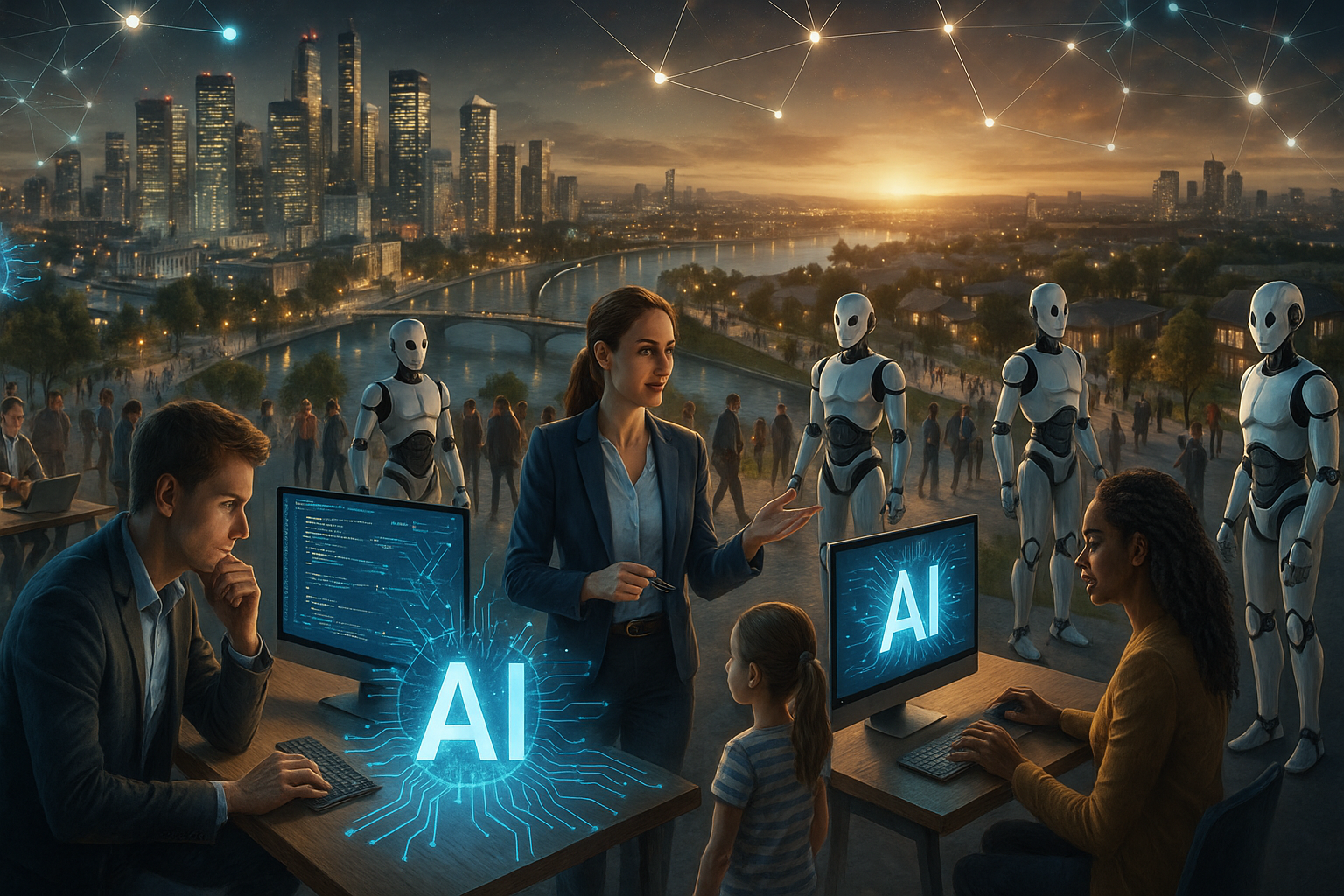
AI and Jobs.
Empowering People: Shaping a Future Where AI and Human Ingenuity Thrive Together.
-
Shaping the Future of Work.
The future workforce will require a blend of technical and soft skills to interact effectively with AI systems. Reskilling programs help workers adapt to new AI-powered roles in fields like healthcare, logistics, and data analysis to name a few. These programs are designed to ensure that individuals can build careers that leverage AI technologies rather than be replaced by them.
-
Learn About Reskilling.
Advocating for policies like the Artificial Intelligence Accountability Act of 2024, which supports upskilling and reskilling initiatives to equip workers with AI-related skills needed to thrive in an evolving economy is essential. To meet the rising demand from displaced workers, we aim to push policymakers to expedite the passage of this critical legislation. In parallel, we wish to collaborate with educators and lawmakers to promote inclusive education programs that empower individuals across industries to succeed in AI-driven roles. These ongoing efforts are key to helping the workforce adapt to the dynamic demands of the AI economy.
-
Explore Workforce Programs.
As the workforce evolves, a wide range of programs are available to help individuals build the skills needed to thrive in a changing economy. From technical fields like AI, machine learning, and data science to essential areas such as critical thinking, leadership, ethics, and adaptability, these programs prepare workers for success across industries. Organizations like Google, IBM, and leading universities offer certifications and training that combine technical expertise with human-centered skills, ensuring that people are equipped not only to work with AI, but to shape the future alongside it.
AI and the Future of Work: Why Reskilling Matters
By 2030, artificial intelligence and automation are expected to significantly reshape the American workforce. According to McKinsey Global Institute, up to 30% of hours worked in the U.S. could be transformed by AI, with major shifts in sectors like manufacturing, healthcare, finance, and retail. This transformation could require up to 12 million U.S. workers to transition into entirely new occupations without adequate reskilling.
At the same time, AI offers immense potential to create more jobs than it displaces—particularly in emerging fields like healthcare support, green energy, AI maintenance, and data science. The World Economic Forum projects that while 22% of global jobs may be disrupted by AI by 2030, this shift could also result in a net gain of 78 million new roles worldwide.
However, the scale of the transition is massive. Studies by Goldman Sachs and the International Monetary Fund estimate that up to 60% of jobs in developed countries, including the United States, could be impacted by AI—either through partial automation, evolving job requirements, or full role displacement. This equates to approximately 90 million American workers facing significant change, with tens of millions needing to be reskilled to remain competitive.
To put it in a nutshell, while projections vary depending on whether we’re measuring hours, tasks, or full job roles, the consensus is clear: AI will touch nearly every industry. Though some jobs will be eliminated or transformed, many others—especially those involving AI oversight and development—will emerge. The key is ensuring workers are prepared for this transition.
The pressure to reskill is growing rapidly. Research shows that nearly all jobs will require some level of digital proficiency by 2030, and 59% of workers globally will need upskilling or reskilling to adapt. If addressed strategically, this shift presents an economic opportunity: according to PwC and the World Economic Forum, investment in workforce development could boost global GDP by $6.5 trillion by the end of the decade.
The 2025 Work Trend Index Annual Report by Microsoft highlights one of the biggest drivers of this transformation: the rise of AI agents—software-based digital teammates that will increasingly support, and in some cases lead, business functions. Organizations are evolving through three phases: starting with AI personal assistants, moving into human-agent collaboration, and ultimately enabling AI systems to manage entire workflows with human oversight. As this progresses, many workers will shift into roles as “agent bosses”—designing, training, and supervising AI agents.
Key findings from Microsoft’s report include:
82% of U.S. business leaders expect to adopt AI agents within the next 12–18 months.
33% are already considering reducing headcount as a result of AI integration.
78% are prioritizing AI-specific hires, making AI literacy the #1 most in-demand skill across industries (LinkedIn, 2025).
These developments make clear that AI is not just automating tasks—it’s redefining the structure of work itself. White-collar sectors such as customer service, finance, HR, marketing, and data analysis are particularly vulnerable to transformation or replacement by AI systems.
That’s why passing legislation like the Artificial Intelligence Accountability Act of 2024 is critical. With the right policies, education systems, and employer commitments in place, we can help workers not only adapt—but lead—in an AI-powered economy.
We strongly advocate for urgent and sustained investment in reskilling programs to ensure that American workers are not left behind. With proactive action, we can build an inclusive economy where people and machines work together—and where technological advancement becomes a source of empowerment rather than exclusion.


